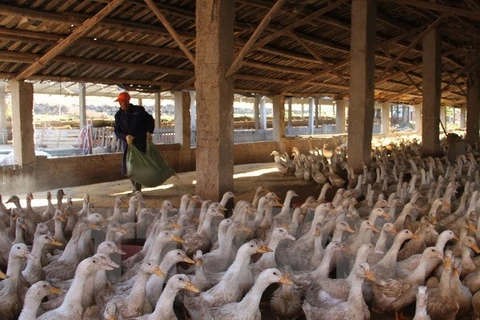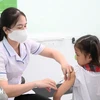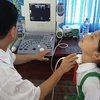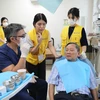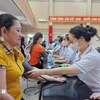Hanoi (VNA) – Vietnam has so far recorded no infections of human A/H7N9 avian flu, however, the country is promoting efforts to prevent the entry of virus, which caused a new outbreak in neighbouring China.
According to the Preventive Medicine Department under the Ministry of Public Health, the long borderline shared with China and busy cross-border trade activities between the two countries pose a high risk of H7N9 virus to be transmitted into Vietnam.
The World Health Organisation (WHO) said that China has reported 340 human A/H7N9 avian flu cases in 13 provinces and cities nationwide so far this year. Almost the infected cases had a history of exposure to live poultry in markets or areas polluted by infected poultry.
The number of human A/H7N9 cases have continually increased in China since October last year, causing the fifth outbreak in the country since 2013, the WHO reported.
To proactively prevent the disease, the Vietnamese Ministry of Health recommended people to not use poultry or poultry products with unknown origins, and ensure food hygiene.
They were told to immediately notify local authorities and veterinary units if they detected any sick or dead poultry.
People should visit doctors to be counselled, examined and receive treatment if they have flu-like symptoms, such as fever, cough, chest pain or breathing difficulty, the ministry said.-VNA
According to the Preventive Medicine Department under the Ministry of Public Health, the long borderline shared with China and busy cross-border trade activities between the two countries pose a high risk of H7N9 virus to be transmitted into Vietnam.
The World Health Organisation (WHO) said that China has reported 340 human A/H7N9 avian flu cases in 13 provinces and cities nationwide so far this year. Almost the infected cases had a history of exposure to live poultry in markets or areas polluted by infected poultry.
The number of human A/H7N9 cases have continually increased in China since October last year, causing the fifth outbreak in the country since 2013, the WHO reported.
To proactively prevent the disease, the Vietnamese Ministry of Health recommended people to not use poultry or poultry products with unknown origins, and ensure food hygiene.
They were told to immediately notify local authorities and veterinary units if they detected any sick or dead poultry.
People should visit doctors to be counselled, examined and receive treatment if they have flu-like symptoms, such as fever, cough, chest pain or breathing difficulty, the ministry said.-VNA

